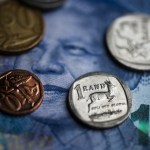- No evidence Kyiv government involved in pipeline hit — NYT
- Ukraine “absolutely not involved”, Zelensky aide says
- Russia: Reports justifies push for UN-backed investigation
- Ukraine vows to send more troops into beleaguered Bakhmut
- Sees chance to break Russian force fighting to take city
- Russia seeks rare victory after winter campaign
The US and Nat0 have called the attacks, which occurred seven months into Russia’s invasion of Ukraine and destroyed three of the four pipelines running under the Baltic Sea, “an act of sabotage”.
Moscow has blamed Ukraine’s Western supporters and has called on the UN Security Council to independently investigate. Neither side has provided evidence.
Citing US officials, the New York Times said there was no evidence that Ukrainian President Volodymyr Zelensky or his top aides were involved in the operation or that the perpetrators were acting at the behest of any Ukrainian government officials.
White House spokesperson John Kirby told reporters on Tuesday that Washington was waiting for ongoing investigations in Germany, Sweden and Denmark – all in the Baltic region – to conclude, “and only then should we be looking at what follow-on actions might or may not be appropriate”.
Responding to the report, senior Zelensky adviser Mykhailo Podolyak told Reuters that the Kyiv government was “absolutely not involved” in the sabotage strike, and had no information about what had happened.
Russia’s deputy United Nations ambassador Dmitry Polyanskiy told Reuters the report proved Moscow’s push for the Security Council to set up an independent inquiry was “very timely” and it would seek a vote on a draft resolution by the end of March.
The Times wrote that the intelligence review suggested those behind the pipeline explosions, which spewed gas into the Baltic, were Ukrainian or Russian nationals, or a combination of the two, who opposed Russian President Vladimir Putin.
But the review did not specify the members of the group or who directed or paid for the operation, it said.
“US officials declined to disclose the nature of the intelligence, how it was obtained or any details of the strength of the evidence. They have said that there were no firm conclusions about it,” the Times added.
Built by Russia’s state-controlled Gazprom, the Nord Stream gas pipelines connected Russia and Germany. Nord Stream 1 was completed in 2011, and Nord Stream 2 in 2021 – over the objections of Ukraine and some of Germany’s allies including the US who feared this would allow Moscow to blackmail Berlin by threatening to curb supplies.
Germany ended up halting certification of Nord Stream 2 amid signs that Russia was about to invade Ukraine, and since then Europe has drastically cut energy imports from Russia.
Gazprom representatives did not immediately respond to a request for comment on the New York Times report.
Battle for Bakhmut
In its invasion, which passed the one-year mark on 24 February, Moscow has sent thousands of troops in waves over recent weeks to try to capture the eastern Ukrainian city of Bakhmut and secure its first battlefield victory in more than half a year. Ukrainian forces have dug trenches further west and in recent days had seemed to be preparing to pull out.
But Zelensky early on Tuesday publicly committed his troops to holding out in Bakhmut, apparently prolonging the war’s bloodiest battle in a bid to break Moscow’s assault force.
His remarks in an overnight address suggested Kyiv had elected not only to stay and fight on, but to reinforce the city, apparently convinced that Russia’s losses in trying to storm it would be greater than those of the defenders.
“I told the commander-in-chief to find the appropriate forces to help our guys in Bakhmut,” Zelensky said.
Iryna Vereshchuk, a deputy Ukrainian premier, said on state TV that fewer than 4,000 civilians – including 38 children – out of a pre-war population of about 70,000 remained in bombed-out Bakhmut.
Russia, which claims to have annexed nearly 20% of Ukraine’s territory, says taking Bakhmut would be a step towards seizing the surrounding industrial Donbas region, a major war aim.
“The liberation of Artemovsk continues,” Defence Minister Sergei Shoigu said in televised remarks, using the Soviet-era name for Bakhmut, re-adopted by the invading Russians.
“The city is an important hub for defending Ukrainian troops in the Donbas. Taking it under control will allow further offensive actions to be conducted deep into Ukraine’s defensive lines.”
Western strategists say the ruined city has limited value, and Russia’s assault may aim for a symbolic victory after a winter offensive involving hundreds of thousands of conscripted reservists and fighters from the Wagner private army.
Ukraine’s military command reported a record 1,600 Russians killed over the previous 24 hours. Moscow said Ukraine’s losses in February had risen 40% from January to 11,000.
Tolls of enemy dead cannot be confirmed and the sides do not release regular data on their own casualties, but past Ukrainian reports of spikes in Russian losses have corresponded with failed Russian assaults.
Reuters journalists have not been inside Bakhmut for a week and could not independently verify the situation there.
Russia calls its actions in Ukraine a “special military operation” to eliminate security threats arising from its fellow ex-Soviet republic’s ties to the West. Kyiv and its Western supporters call it an unprovoked land grab.
Tens of thousands of Ukrainian civilians have been killed as well as soldiers on both sides. Russia has bombarded Ukrainian cities and set millions of civilians to flight in what Kyiv and the West call an unprovoked war of conquest.
While Russia has made gains in recent weeks around Bakhmut, its winter offensive has otherwise been a failure, yielding no significant gains in major assaults further north and south.
Kyiv, which recaptured swathes of territory in the second half of 2022, has spent the past three months on the defensive, trying to exhaust the attacking Russians before an expected Ukrainian counteroffensive later this year.
(Reporting by Jonathan Landay, Simon Lewis and Olena Harmash.)





















 Become an Insider
Become an Insider
Comments - Please login in order to comment.